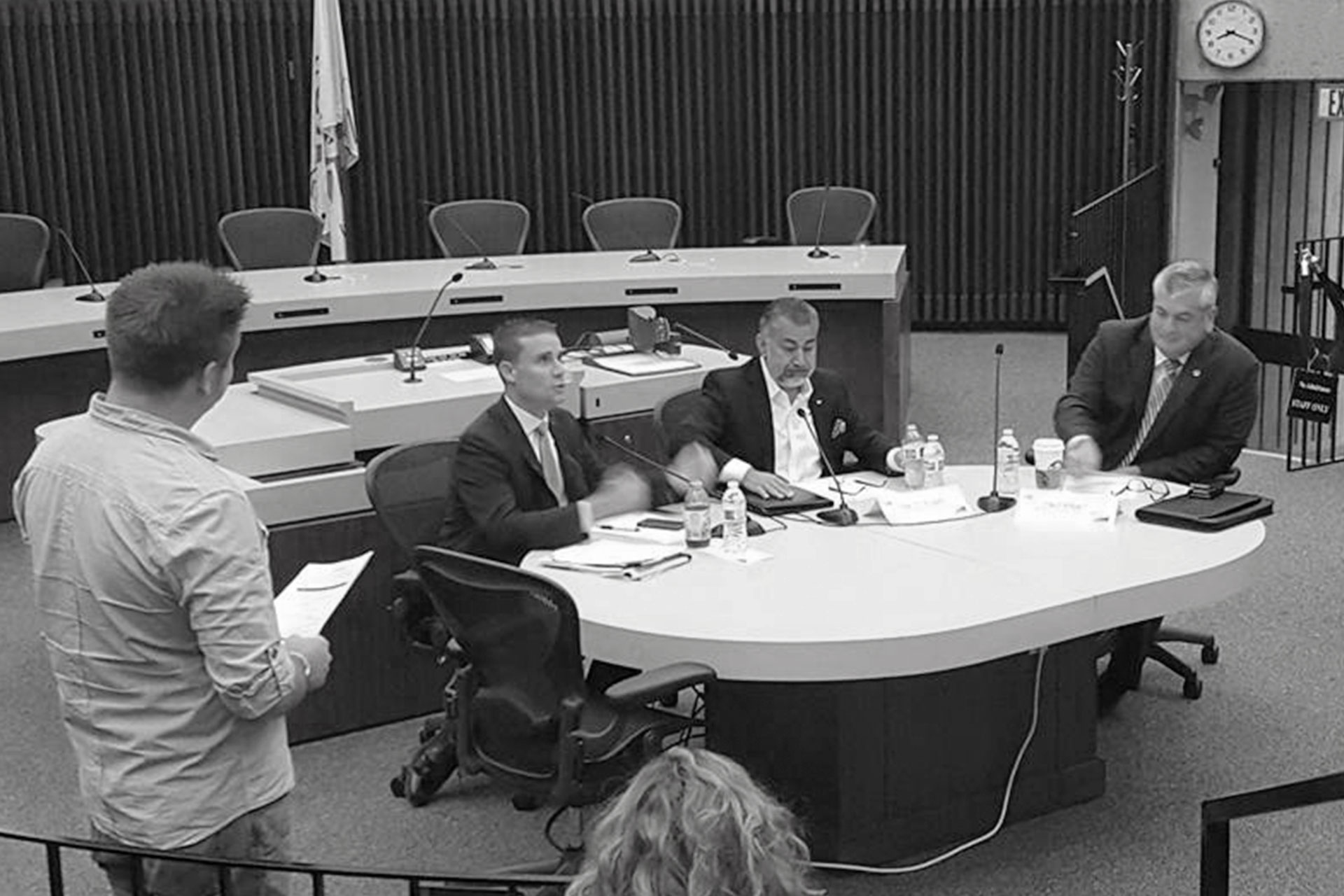My story about the second Leadership Santa Rosa program day, Government and Politics, truly began several months ago at the Class XXXII retreat where several of my classmates and I had a discussion about the reunification of Courthouse Square in Santa Rosa, an important and contentious project which has been in the works for many years. That spirited discussion inspired me to complete our homework assignment by attending the City Council meeting in September where the City Council decided to move ahead with funding the project, and that meeting became a tipping point for me to speak out in support of the City Council’s decision by writing a letter to the local newspaper, the Press Democrat.
And so, with my freshly inspired spirit for civic engagement, I entered the City Council chambers again in October to learn all about government, policy, and politics during our program day.
Our first activity, after a delicious breakfast of course, was a pair of panel discussions. The first panel discussed how the levels of government interact with each other, and included Senator Mike McGuire from California’s 2nd Senate District, Council Member Ernesto Olivares from the Santa Rosa City Council (and LSR Class XIII), and Supervisor David Rabbitt from the Sonoma County Board of Supervisors, and also a fellow architect. Senator McGuire described a bill that he authored and that was recently signed into law by the Governor providing comprehensive regulation for the medical marijuana industry. It’s a big, complicated issue that all levels of government are dealing with because marijuana is currently a $40 billion industry. Since 60% of the marijuana grown in the U.S. comes from our neighbors in Mendocino, Lake, Humboldt, and Trinity Counties, Northern California disproportionately suffers the environmental damage cause by illegal growing, including pesticide runoff, clear cut forest land, and dried up rivers. The purpose of the new legislation is to put in place a baseline of rules that any future proposition legalizing recreational marijuana in California will have to meet or exceed.
The second panel discussed the business of government and included Jeff Kolin, a retired City Manager for the City of Santa Rosa and the City of Beverly Hills, Sean McGlynn the current City Manager for the City of Santa Rosa, and Jim Leddy, the Director of Special Projects at the County of Sonoma. One of Mr. Leddy’s projects is to end homelessness in Sonoma County. There were 3,107 homeless people in Santa Rosa at the last census in January, which puts us at three times the national average. Due to the very low 1.5% vacancy rate in Santa Rosa, the primary focus has been to build more housing, the goal being 2,000 new units. Unfortunately, housing always loses out to roads when it comes to public funding priorities. So, it’s another complicated issue that involves all levels of government. I guess if you want easy problems to solve, don’t get into politics!

Following the panel discussions, a few class members volunteered to participate in a hilarious and highly entertaining mock city council forum. Six city council “candidates” acted as caricatures of different types of politicians, and we got to “vote” for our favorites. I would have wilted under the pressure, but my classmates performed amazingly and the whole room got a good laugh.
After the forum mockery, it was back to business with another pair of panel discussions. The first panel discussed how the public gets their information and included Ed Beebout, an Associate Professor from the Communication Studies Department at Sonoma State University, Jim Sweeney, the Assistant Editorial Director at the Press Democrat, and Kevin McCallum, a Staff Reporter who covers the Santa Rosa City Hall beat for the Press Democrat. Their discussion helped reinforce for me how the press is so important in shaping public perception, and how diligent writers and editors need to be in understanding their own biases in order to maintain objectivity.
The second panel discussed how to run a political campaign and included Jenny Chamberlain, campaign manager for Sonoma County Supervisor James Gore and current 4th District Director, and Herb Williams, President of Delphi, a consultation firm based in Santa Rosa. Mr. Williams is quite a firecracker and I would hate to find myself in a campaign against one of his clients. I consider myself a bit of a political junky, but I can’t quite measure up to the way Mr. Williams put it when he said “I get up in the morning, I take my syringe and fill it with politics, and I love it!”
Following Mr. Williams’ presentation, we broke into small groups and had a fun little competition developing a campaign for or against a fictional proposition to legalize recreational marijuana. Although, my group clearly had the best logo, we lost the competition with our decision to buy ad time on the radio. We were going for the older demographic, but apparently radio ads are a bad investment. Oh well!
The final panel discussion was about influencing policy makers and included Herman Hernandez, the founder of Los Cien, Tanya Narath, Chair of the Santa Rosa Community Advisory Board, and Marlene Soiland, President of Sonoma County Alliance. Mr. Hernandez is a passionate, sincere, and inspiring character and it is no surprise that his group, Los Cien, whose mission is to encourage political engagement and communication in the Latino community, has grown in 6 short years to over 700 members.
Whew! That was a lot for one day, but it left me hungry for more. Stay tuned for next month’s topic, Business and the Economy.


